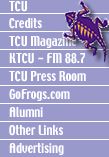|
Friday,
October 26, 2001
Plagiarizing
papers from Internet is problem on campus
By
Jordan Blum
Staff Reporter
James
Riddlesperger, chair for political science, asked one of his
classes last Thursday if they could believe students actually
plagiarize from Web sites, while speaking about the availabilty
of research papers on the Internet.
“Are
you serious?” junior political science major Kenny Thompson
said while smiling.
Riddlesperger responded by tossing an eraser at Thompson to
the response of class laughter.
Riddlesperger
said he jokingly threw the eraser to illustrate his point
that all students are aware of the availability of papers
on the Internet and that it is a legitimate problem on college
campuses.
But Riddlesperger
and other professors say plagiarizing papers from Web sites
isn’t a joking matter and needs to be handled seriously.
David
Vanderwerken, chair for the English department, said it is
easier for students to plagiarize from the Internet than it
is to do research in the library, and those students caught
are strictly punished.
“It’s
easy as pie for a student to get on the Internet and download,
cut, paste and print and they’re done,” Vanderwerken
said. “But those who cheat risk getting in hot water.
Although, for every one (student) we bust there’s probably
three or four who get away with it.”
He said
four students have already received failing grades in English
classes this semester for being caught copying entire papers
from Web sites.
Tim Davis,
a junior business major, said he has been forced to learn
the repercussions of plagiarizing from Web sites the hard
way.
Davis
said he copied a paragraph from a group member’s notes
and turned it in as a part of his essay. He said he did not
know where the paragraph came from, but that when he and his
group member ended up getting caught for having the same paragraph
he discovered it had come from an Internet essay. Davis said
he was given an F for the class because he made a poor decision
about one paragraph.
“There’s a much higher chance of getting caught
(for cheating) using the Internet because teachers check most
of them,” Davis said. “But students copy (Internet
essays) because we’ve got so many other things going
on with class and work and it usually becomes a last resort
when we run out of time. But some people are just lazy.
“I’m
sure that at least 90 percent of students at TCU have plagiarized
something, whether it be a sentence or a whole paper.”
A junior
business major, who requested his name be kept confidential,
said he had copied papers from the Internet on several occasions
and plans to continue doing so until he gets caught.
“In
my sophomore English class I got my whole paper off of SchoolSucks.com,
and I even got an A on it,” he said. “I can be lazy
sometimes, and then I end up getting stressed out when I’m
running out of time.
“Writing
doesn’t even have anything to do with my major, so I
don’t see what the big deal is.”
Vanderwerken
said the students are to blame, but the Web sites that sell
papers to students are not innocent either.
“These
services take a kid’s money and then have no problem
turning students in to university faculties. They have no
moral basis or ethics at all,” he said. “My little
fantasy is for the (English) department to hire a hacker to
send viruses to all these (Web) sites.”
However,
Jim Kulk, the president of Research Assistance, a company
that sells papers over the Internet and offers custom papers
written to customers’ specifications, said his company
sells knowledge from a database of information and shouldn’t
be blamed for cheating.
“The
potential for cheating is the same with us as with any other
legitimate news site,” Kulk said. “We sell information
from a database the same way WSJ.com (The Wall Street Journal)
and Lexis-Nexis.com work. It’s unfair for my site to
always be targeted when we’re the same as everyone else.”
Kulk
also said there’s a disclaimer on the Web site that warns
against plagiarism and said he has no idea if people use papers
bought from the company to cheat.
Assistant
English professor Bonnie Blackwell said students are often
sloppy and it is easy to spot plagiarism, but when students
just copy a few sentences from Web sites it usually goes by
unnoticed.
Blackwell
said the best way to stop students from copying off the Internet
is to “plagiarize proof” paper assignments by narrowing
the topic to focus on ideas only discussed in classes. However,
she said papers from Web sites that offer custom papers are
hard to catch.
“You
don’t learn anything by cheating and you’re wasting
the opportunity of having access to professors and being able
to share ideas,” she said.
Jordan Blum
jdblum@student.tcu.edu
|
